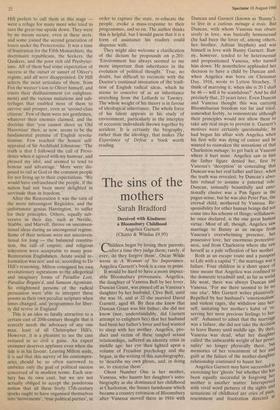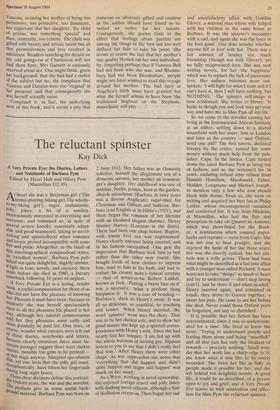The sins of the mothers
Sarah Bradford
Deceived with Kindness: a Bloomsbury Childhood Angelica Garnett (Chatto & Windus £9.95)
'Clhildren begin by loving their parents; %..../after a time they judge them; rarely, if ever, do they forgive them', Oscar Wilde wrote in A Woman of No Importance. Angelica Garnett's book is a case in point.
It would be hard to have a more impecc- able Bloomsbury provenance. Angelica, the daughter of Vanessa Bell by her lover, Duncan Grant, was passed off as Vanessa's daughter by her husband, Clive Bell, until she was 16, and at 23 she married David Garnett, aged 48. By then she knew that Duncan Grant was her father; she did not know (nor, understandably, did Garnett attempt to enlighten her) that her husband had been her father's lover and had wanted to sleep with her mother. Angelica, pro- duct and victim of these tangled sexual relationships, suffered an identity crisis in middle age; her eye then lighted upon a volume of Freudian psychology and she began, in the writing of this autobiography, to 'describe my own ghosts, and, in doing so, to exorcise them'.
Ghost Number One is her mother, Vanessa, who haunts her daughter's auto- biography as she dominated her childhood at Charleston, the Sussex farmhouse which became a country extension of Bloomsbury after Vanessa moved there in 1916 with
Duncan and Garnett (known as 'Bunny'), to live in a curious menage a trots. But Duncan, with whom Vanessa was obses- sively in love, was basically homosexual (he had been the lover of, among others, her brother, Adrian Stephen) and was himself in love with Bunny Garnett. Bun- ny, however, tended to be heterosexual and propositioned Vanessa, who turned him down. He nonetheless applauded her decision to have a child by Duncan and, when Angelica was born on Christmas Day, 1918, wrote to Lytton Strachey, 'I think of marrying it; when she is 20 I shall be 46 — will it be scandalous?' And he did precisely that, 23 years later. Even Duncan and Vanessa thought this was carrying Bloomsburian freedom too far and tried, somewhat feebly, to remonstrate although their principles would not allow them to take any real steps to prevent it. Garnett's motives were certainly questionable; he had begun his affair with Angelica when his first wife was dying of cancer and he wanted to reawaken the sensations of that Charleston menage, to get back at Vanessa where it hurt most. Angelica saw in him the father figure denied her, first by Vanessa's 'deception' in concealing that Duncan was her real father and later, when the truth was revealed, by Duncan's abso- lute refusal to assume a paternal role. Duncan, sensually beautifully and emo- tionally elusive was a Pan figure in the pagan sense, but he was also Peter Pan, the eternal child, mothered by Vanessa. Re- sponSibility for other human beings did not come into his scheme of things; selfishness, he once declared, is the one great human virtue. Most of all, though, Angelica saw marriage to Bunny as an escape from Vanessa's overwhelming presence, her possessive love, her enormous protective- ness, and from Charleston where she saw herself as a pale reflection of her mother. Both as an escape route and a passport to Life with a capital 'I', the marriage was a failure. Four children in a short space of time meant that Angelica was confined to the domestic treadmill and, as far as social life went, there was always Duncan and Vanessa. 'For me there seemed to be no one else', Mrs Garnett writes plaintively; Repelled by her husband's 'emotionalism and violent rages, she withdrew into her- self, imitating her mother's habit of 're- serving her most precious feelings to her- self'. Ashamed to admit that the marriage was a failure, she did not take the decision to leave Bunny until middle age. By then, Vanessa was dead, what her daughter called 'the unbearable weight of her perso- nality' no longer physically there, but memories of her resentment of her and guilt at the failure of the mother-daughter relationship continued to haunt her. Angelica Garnett may have succeeded in exorcising her 'ghosts' but whether she has been equally successful in forgivin heir mother is another matter. Interspgersal, with vivid word pictures of the sights and sensations of childhood are cries of pain' resentment and frustration directed at
Vanessa, accusing her mother of being too Permissive, too protective, too dominant, too expectant that her daughter, the child of genius, was something 'special' and then, contrarily, too remote. The child was gifted with beauty and artistic talent but all that permissiveness and love resulted in inhibition. Readers searching for details on the odd goings-on at Charleston-will not find them here; Mrs Garnett is curiously reserved about sex. One might think, given her background, that she had had a surfeit of the subject but no, she complains that Vanessa and Duncan were too 'virginal' in her presence and that consequently she was herself sexually naive.
Complaint is, in fact, the underlying note of this book, and it seems a pity that someone so obviously gifted and creative as the author should have found so in- verted an outlet for her talents. Courageously, she quotes Gide to the effect that feelings about parents are among the things in life best not too well defined but fails to take his point. She seems to resent the fact that her mother's star quality blotted out her own individual- ity, forgetting perhaps that if Vanessa Bell had not been who she was, and Blooms- bury had not been Bloomsbury, people might not have wanted to read this voyage around her mother. The bad fairy at Angelica's birth must have granted her what she herself admits to have been 'the traditional bugbear of the Stephens, masochistic self-pity .







































 Previous page
Previous page